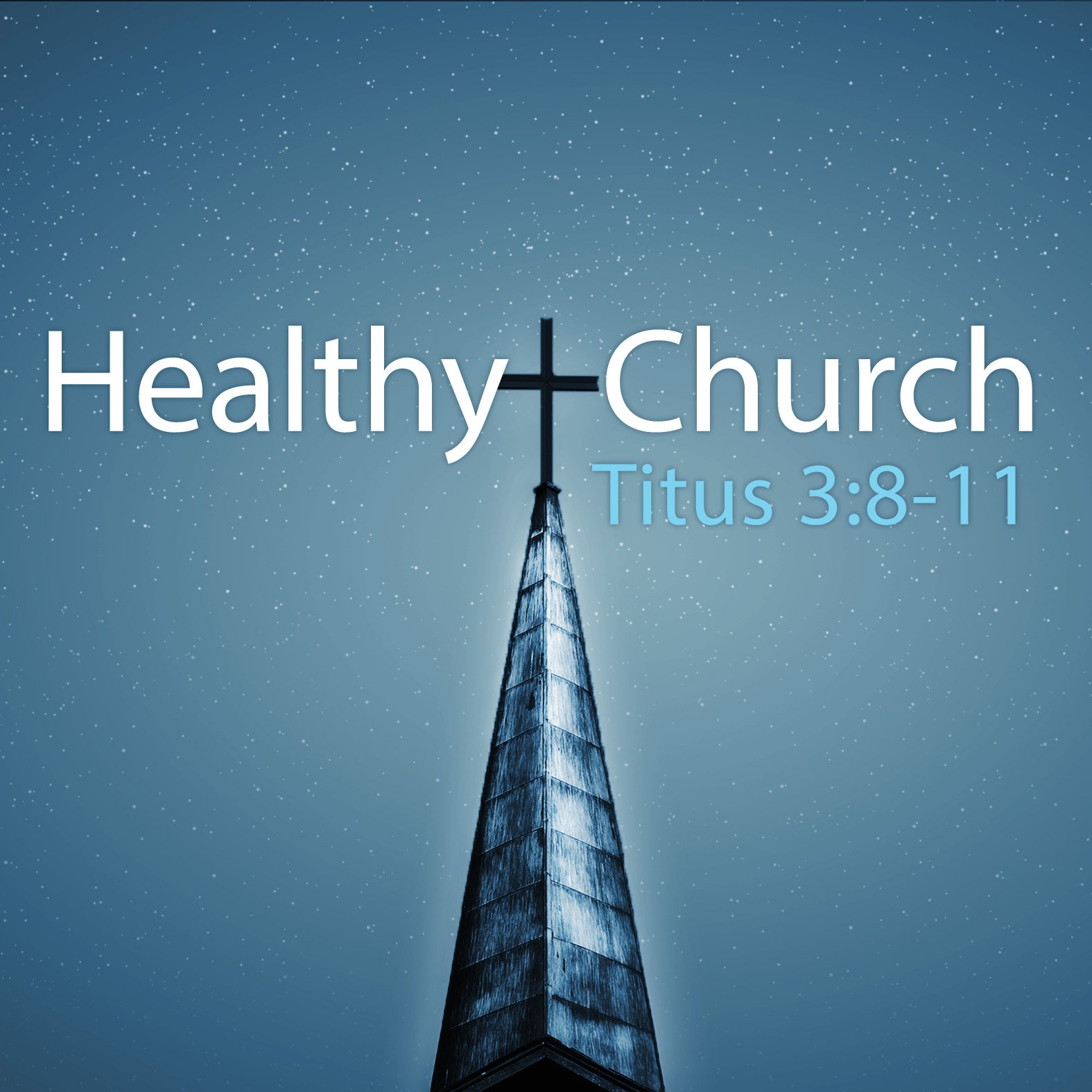All for the Kingdom
Sermon Podcast
United in Faith, Titus 3:12-15
In this closing greeting from Paul to Titus, we get a glimpse into the efforts of first-century saints to carry out the gospel mission in their churches and around the globe. Some were traveling to preach the gospel and teach sound doctrine. To support these efforts, the churches generously offered what they had. Paul, his fellow laborers, and the churches were doing all they could to advance the kingdom of God.
United in faith, every member of the church must use every resource God has provided to advance the kingdom of God. Every saint must ask, How can I be a useful servant of God in advancing His kingdom? These closing words teach three ways the church is effective for kingdom advancement.
Healthy Church, Titus 3:8-11
What is required for a church to be healthy?
As the collapse of cultural Christianity has taken its toll on weekly attendance, churches have had to reevaluate what it means to be a healthy church. The blessing of this reevaluation is renewed attention to biblical models and metrics of church health. The disappointment of this reevaluation is an awareness that many have abandoned the biblical fundamentals of what it means to be a church in our zeal for greater numbers.
Titus 3:8-11 gives three instructions that are required for a church to be healthy.
Serve with Honor, 1 Timothy 6:1-2
1 Timothy 6:1-2 is not an endorsement of slavery, but it is an acknowledgment that slavery was part of the societal reality in which the church in Ephesus lived. Recognizing these realities, Paul instructs the church to live according to who they are in Christ, even in the brokenness of this world. In these verses, the Bible instructs Christians on how to labor for unbelieving masters and for masters who are fellow brothers in Christ.
Honor the Labor of Elders, 1 Timothy 5:17-25
Having instructed the church to honor, with financial support, widows who were worthy of such honor and had no other source of support, Paul now instructs the church on its proper relationship with Elders. Like with the instructions concerning widows, the church is commanded to honor elders with financial support. However, more than just instructions on elder remuneration, this text teaches the church what it should honor, its responsibility to protect its elders, and a warning to be wise in choosing future elders.
Testimony of Honor and Service, 1 Timothy 5:3-16
The reality of living in a sin-filled fallen world is that you often treasure what is not worthy of honor while neglecting to honor what is a true treasure.
1 Timothy 5:3-16 commands the church to honor widows in the church who are without any means of support and who have lived a testimony of faithful devotion to the Lord and the church's work. As Paul gives instructions for this support, we learn the responsibility of the household of God to honor members in need, the reason for this honor, and some practical truths about family, devotion to the church, and the God-honoring labor of raising children.
Trained for Godliness, 1 Timothy 4:6-16
The instructions of 1 Timothy 4 are addressed to Timothy and his church pastoral leadership. At first reading, it may seem that verses 6-16 relate only to overseers' leadership, preaching, and teaching ministry of the church. Though these instructions are addressed to the overseer, they relate to the whole church in understanding proper biblical training, personal holiness, and the church's public worship. These instructions to the overseer help the church understand what should be honored and celebrated in the leadership of the overseer, the importance of personal holiness, and what should be honored in their public assemblies.
Beware of Demonic Lies, 1 Timothy 4:1-5
God inspired Paul to warn the church of demonic spirits that are working to deceive and lead some away from the faith. This danger remains a clear and present danger to the church today. Paul identifies the threat and then instructs the church to recognize and defeat these lies.
The Church: Pillar and Buttress of Truth, 1 Timothy 3:14-16
The sad reality of the present-day church culture is the lost understanding of the church's witness to God's truth and the hope of the gospel. Every faithful church and every church member should be living witness in their community to the truth of God and the hope of the gospel. This is the heart behind Paul's instructions in 1 Timothy 3:14-16. This passage teaches who has authority over the church, its purpose, and its message.
Danger Alert, 1 Timothy 1:1-7
No church is perfectly rightly ordered. However, every church must have a heart to be as rightly ordered and faithful to scripture as possible. The church must regularly examine how it is organized and functions and determine if it is most faithful to scripture. Paul's letters to Timothy deal with many of these issues, which is why it is helpful for Christians and churches to return often to these instructive letters.
These letters to the young pastor are Paul's counsel on leading the church in proper worship and establishing proper church leadership. He instructs Timothy on the required qualifications for elders/pastors/overseers and deacons and gives counsel on confronting false teachers and other congregation members.
In these opening words of Paul's first letter to Timothy, he first warns of what threatens the church and recognizes the gift of elders to the church.
Confronting Sin, 2 Corinthians 13:1-4
As Paul concludes his letter, he gives some final warnings and instructions. His final warning can be broken into two parts, confrontation of sin and examining your faith to test if it is genuine. In this sermon, I preach on the first part concerning the confrontation of sin.
Confronting sin and church discipline is something that most Christians know should be happening, but they have not seen a healthy or consistent model of how it happens. And a more honest assessment may be that many Christians have no motivation to faithfully participate in church discipline because they enjoy the lack of accountability in their church.
Understanding this passage and how to confront sin requires understanding three principles of healthy, godly discipline:
Discipline is motivated by love.
Discipline is connected to worth.
Discipline is connected to church fellowship.
He is Faithful, 1 Corinthians 1:1-9
When Paul wrote his first letter to the Corinthian church, he knew he had to confront some serious issues of sin. There was trouble in the church. Some members were guilty of sexual sin, others of drunkenness, and others were attempting to justify their worldly living with a perverted understanding of the grace of God. The city of Corinth was well known as a place of debauchery, and the church struggled to live holy in such a perverse context.
Paul would be unflinching in his confrontation of sin in the church. However, before he does, he begins with an encouraging word to remind the church who they are and the blessings they have received.
We, too, live in a cultural context of unrestrained debauchery. Likewise, the church today often struggles with living holy. Thus, it is good to hear again that those who have been saved by the blood of Jesus are saints of God, under the grace of God, and sustained by the faithfulness of God.
Blessed by Fellowship, Romans 15:22-32
There are some places that you long to be. Maybe for you, it is at home or being with friends. These places and people refresh your soul. They offer you an opportunity to relax and be restored. Such places and people are both needed and desired.
As Paul closed his letter to the Romans, he expressed how he longed to be with his fellow believers. His longing was not just to have a meal or to be with friends (he had never been with the Roman church), but rather he longed to be with other believers who could (because of their shared relationship with Jesus) have fellowship with him.
The fellowship of believers is created to be a blessing to believers. Among the saints, we find the blessing of community, support, and prayer.
The Church's Mission, 2 Timothy 4:1-5
The book of 2 Timothy was written by Paul to Timothy as a letter of instruction as to how he was to pastor and lead the church. This passage (4:1-5), is often used when giving a charge to a newly ordained pastor – and rightly so.
Yet we should not see this passage as only speaking to or applying to pastors. The books of our New Testament were mostly letters written to encourage individuals and specific churches in their living out of the gospel. Being inspired by the Holy Spirit, the church recognized that these letters were instructive for the whole church and thus passed them around to others for their edification. Thus with a passage like this one, we can appreciate how it speaks to a particular group, but we must not lose sight that all of scripture is instructive and beneficial to the whole church.
2 Timothy 4:1-5 commands us to preach the word, minister the word both for God's glory and man's blessing.
The Church's Worship, Ephesians 5:15-21
Presently there is great confusion about the church’s ministry of worship. Today, many think of the worship ministry of the church as a product of consumption. Thus the main determining factor of attendance for many is founded on personal preferences of music style, preaching style, and formality or informality of the church’s liturgy. Attendance is not understood as an integral part of one’s spiritual life but rather an option equal to all other calendared events.
In this passage, Paul is writing to the church as to how they are to live and interact with other believers in the church. Verses 19 and 20, reference the public worship of the church and the whole passage is instructive for our understanding of worship.
The Church's Testimony, Matthew 18:15-20
Church discipline is a subject that makes many uncomfortable. This may be because the church has not been faithful or consistent, some have used the cover of church discipline to abuse, or so little is understood about it, that there is much misunderstanding. Regardless of how uncomfortable it may cause us to be, we must reckon with the fact that this is the teaching of Jesus. May our heart's desire be to faithfully obey the word of God - even the parts that make us uncomfortable.
The Church's Foundation, Matthew 16:18-19
This passage follows a very significant moment in the life of Peter. Jesus had asked his disciples, “Who do you say that I am?” Peter replied with the powerful confession: “You are the Christ, the Son of the living God.” In verses 18-19 Jesus responds to Peter’s confession. Jesus declares that on this confession of Peter, Jesus will build His church. In this passage, we see that the church is founded on Jesus, sustained by Jesus, and is the testimony of the gospel.
Gather Together, Hebrews 10:24-25
As we have lived through the COVID-19 pandemic and all difficulties that it has brought to the church, we have had to think critically about what it means to be a church gathered for worship. Can the gathering of the church be substituted with a virtual alternative? Is it required for the church to be together? What is the difference between hearing preaching live from the pulpit and watching or listening online? Hebrews 10:24-25 calls us not to forsake the gathering of the saints. It compels us to continue in our faithfulness and gives us a deeper understanding of why we gather and the holy significance of our gathering together as a church.


















